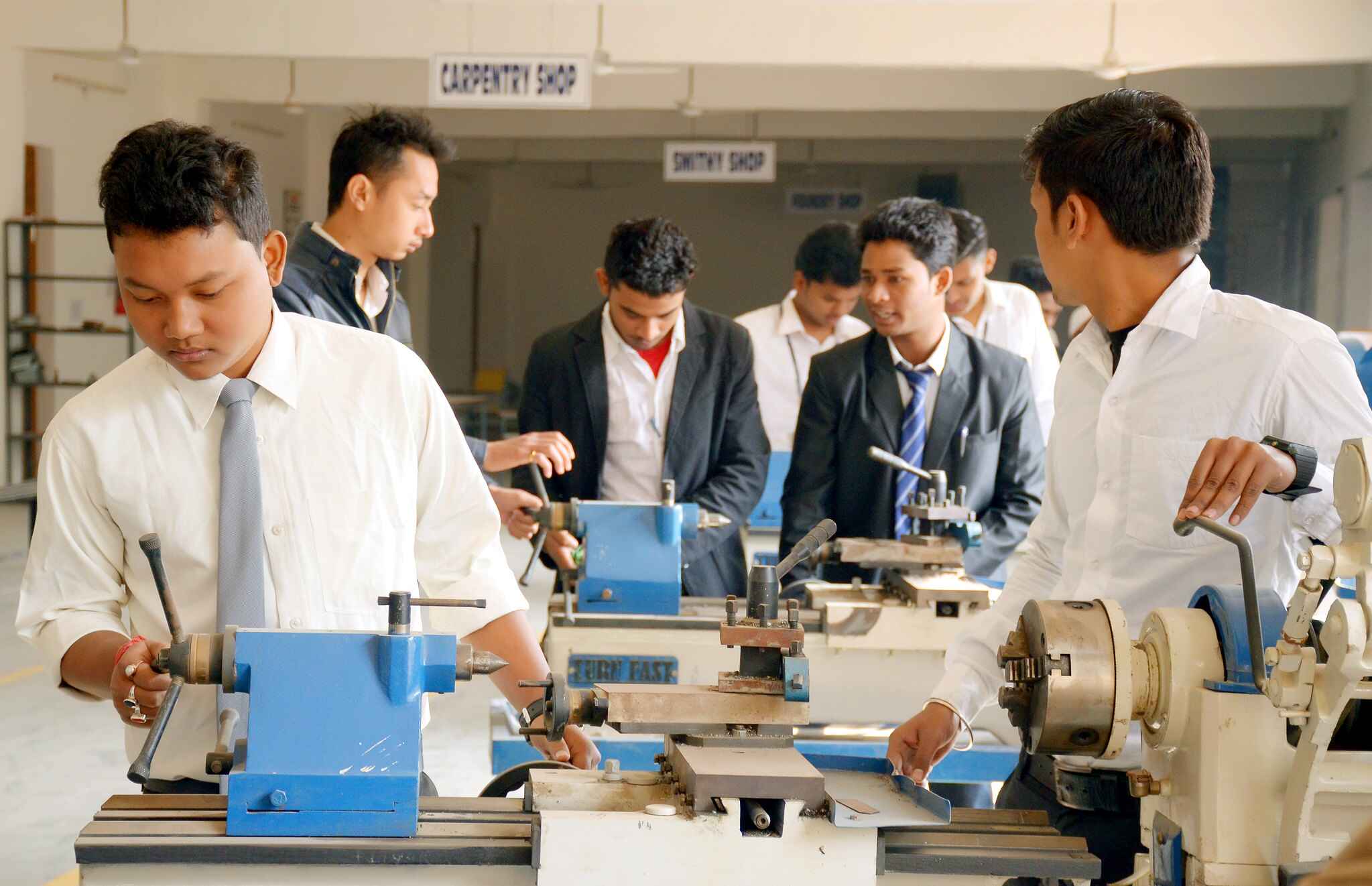
B.Tech Mechanical Engineering
Apply Now
B.Tech Mechanical Engineering
Apply NowMechanical Engineering involves creating and managing systems and machines by using knowledge of physics, materials, and energy. Mechanical engineers work with software like CAD (Computer-Aided Design) to design, test, and make all sorts of equipment.
The Mechanical Engineering Department is known as one of the top places to study mechanical engineering subjects in Punjab, India. Over the years, it has gained a great reputation for training skilled engineers. The courses here teach students everything they need to know for a successful career in Mechanical Engineering, covering a broad range of topics in this ever-important field.
Our program offers a blend of traditional and modern engineering education, focusing on areas like dynamics, thermodynamics, and materials science.
At Guru Kashi University, we're committed to producing skilled engineers who are ready to lead and innovate in the technological world.
Explore your future in mechanical engineering subjects at Guru Kashi University, one of the top colleges in India, located in Punjab. Our B. Tech program offers deep knowledge in areas like dynamics and thermodynamics, along with practical skills in technologies such as Computer-Aided Design (CAD). This mix of learning helps prepare our students for the engineering world's changing needs.
Beyond just book learning, we have top-notch labs and workshops that help students gain real-world experience. Our expert teachers guide and encourage students to innovate and research.
Guru Kashi University is more than a college, it's a vibrant community where students grow to become skilled engineers. Graduating from here means you leave with not just a degree but also the skills and confidence to make a difference in Mechanical Engineering.
Join us at Guru Kashi University for a Mechanical Engineering program that's practical, innovative, and geared towards making you a leader in the engineering field.
7K+ Students
100+ Courses
25+ Countries
To ensure you're ready to embark on this journey, here are the eligibility requirements for the B.Tech Mechanical Engineering program:
Applicants must have completed their 12th-grade (or equivalent) education with Physics, Chemistry, and Mathematics as core subjects.
A minimum aggregate score of 50% in the 12th grade is required to qualify for admission.
We are looking for students who have a keen interest in mechanical systems, a curiosity about how things work, and a desire to solve complex problems through innovative engineering solutions.
B.tech in mechanical is a dynamic field offering endless career opportunities. With skills in designing, analyzing, and creating mechanical systems, graduates are in high demand across various sectors. Here's a quick look at the possibilities:
Automotive Industry
In the automotive sector, engineers are at the forefront of designing and improving vehicles to enhance performance, safety, and sustainability. This involves the development of more efficient engines, the integration of advanced materials to reduce weight and increase durability, and the creation of innovative features that improve the driving experience. With the growing emphasis on reducing carbon emissions, automotive engineers are also heavily involved in the development of electric and hybrid vehicles, contributing significantly to the transition towards more sustainable transportation solutions.
Aerospace Industry
The aerospace industry offers engineers the opportunity to work on the cutting edge of technology, contributing to the development of aircraft, spacecraft, satellites, and more. This field pushes the boundaries of exploration, from commercial aviation and military defense systems to space exploration missions. Aerospace engineers work on the design, development, testing, and maintenance of these complex systems, striving to improve efficiency, safety, and capabilities, enabling humanity to reach new heights and explore
Manufacturing
Engineering in the manufacturing sector involves overseeing the production process of a wide range of products, from consumer goods to industrial machinery. Engineers in this field work to enhance manufacturing efficiency, product quality, and workplace safety through the implementation of advanced technologies and processes. With the advent of Industry 4.0, the integration of robotics, IoT, and data analytics into manufacturing processes is revolutionizing the industry, making it more automated, flexible, and efficient.
Energy Sector
Engineers in the energy sector play a crucial role in addressing the global challenge of sustainable energy production and consumption. This field encompasses both traditional energy systems, such as oil, gas, and coal, and renewable energy projects, including wind turbines, solar panels, and hydroelectric power. Engineers work on developing more efficient and environmentally friendly methods of energy production, transmission, and storage, contributing to the transition towards a more sustainable and resilient energy future.
Robotics and Automation
The field of robotics and automation is transforming industries and daily life by designing robots and automated systems that can perform tasks traditionally done by humans. Engineers in this field work on developing robotic systems for manufacturing, healthcare, agriculture, and service industries, improving efficiency, precision, and safety. The advancements in artificial intelligence and machine learning are further expanding the capabilities of robots, enabling them to perform more complex tasks and interact more naturally with humans.
Research and Development (R&D)
R&D is the backbone of innovation in engineering, where new technologies, materials, and processes are developed to solve complex challenges across various industries. Engineers in R&D work in close collaboration with scientists and other professionals to push the boundaries of what is possible, from developing new materials with enhanced properties to creating technologies that can mitigate environmental impact. This field requires a strong foundation in scientific principles and a creative mindset to envision and realize innovative solutions.
Consulting and Project Management
Engineering consulting and project management involve offering expert advice and overseeing engineering projects from conception to completion. Engineers in this field work with clients to understand their needs, develop feasible solutions, and manage the resources, timeline, and budget of projects. This role requires a broad understanding of engineering principles, strong communication skills, and the ability to lead and coordinate multidisciplinary teams.
Higher Education and Teaching
Engineers who pursue careers in higher education and teaching have the opportunity to educate the next generation of engineers and engage in specialized research. Professors and lecturers in engineering faculties contribute to the academic and professional development of students, preparing them to tackle the challenges of the future. In addition to teaching, they often conduct research in their area of expertise, contributing to the advancement of knowledge and technology.
Entrepreneurship
Entrepreneurship in engineering involves starting a venture to bring innovative solutions to market. Engineers with an entrepreneurial spirit leverage their technical knowledge and creative problem-solving skills to develop new products, services, or technologies that address unmet needs. Starting an engineering-based business requires not only expertise in the technical domain but also skills in business management, marketing, and finance. Entrepreneurs play a crucial role in driving technological innovation and economic growth by transforming ideas into successful ventures.
Each of these sectors offers engineers the opportunity to make a significant impact on the world, whether by advancing technology, promoting sustainability, or improving the quality of life for people around the globe. The diversity of fields within engineering ensures that individuals can find a path that aligns with their interests, skills, and aspirations, contributing to the continuous evolution of our society and environment
A Mechanical Engineering degree opens doors to a future where you can align your career with your passions, whether in traditional sectors or exploring technological advancements.
Embark on a transformative journey with the b.tech in the mechanical engineering program at Guru Kashi University, Punjab. Our curriculum is designed to equip you with a solid foundation in physics, mathematics, and material science, alongside deep dives into thermodynamics, fluid mechanics, and kinematics. With a focus on creativity and innovation, courses in Computer-Aided Design (CAD) and Product Lifecycle Management prepare you to design and improve mechanical products. Hands-on labs and workshops ensure practical experience, while advanced topics like Robotics, Renewable Energy, and 3D Printing keep you at the forefront of technological trends. At Guru Kashi University, you'll benefit from state-of-the-art facilities, experienced faculty, valuable industry connections, and a vibrant campus life.
Join us to shape the future of engineering and become a leader in innovation and success.
Guru Kashi University has established admission cell to bridge the gap between the students and the academic courses. The cell consists of team of career counsellors who understand the student’s choice and area of interest and guide them to choose the right career which will help them to excel in future.
The admission cell contains the information regarding all the courses of diploma, graduate, and post graduate and doctoral programmes. Guru Kashi University is successfully running courses in all fields such as engineering, agriculture, technical, physical education, education, languages, journalism etc.

Alumni Gather at
the Annual Meeting to
share stories and celebrate. The Events
Saw Over 800 Attendees.
Ans: Both Mechanical Engineering and CSE are good, depending on your interests. If you like designing and building physical systems, go for Mechanical Engineering. If you prefer computers and programming, CSE is the better choice.
Ans: Yes, B.Tech Mechanical is a good course for those interested in designing, manufacturing, and working with mechanical systems. It offers diverse career opportunities across various industries.
Ans: Mechanical branches in engineering include robotics, automotive engineering, aerospace, thermal engineering, and manufacturing, among others.
Ans: The future of btech mechanical engineering is promising, with advancements in robotics, renewable energy, aerospace, and automation driving demand for skilled professionals in diverse industries.
Ans: Yes, btech mechanical engineering is expected to remain a good career in 2025, with ongoing demand in areas like renewable energy, robotics, and advanced manufacturing.